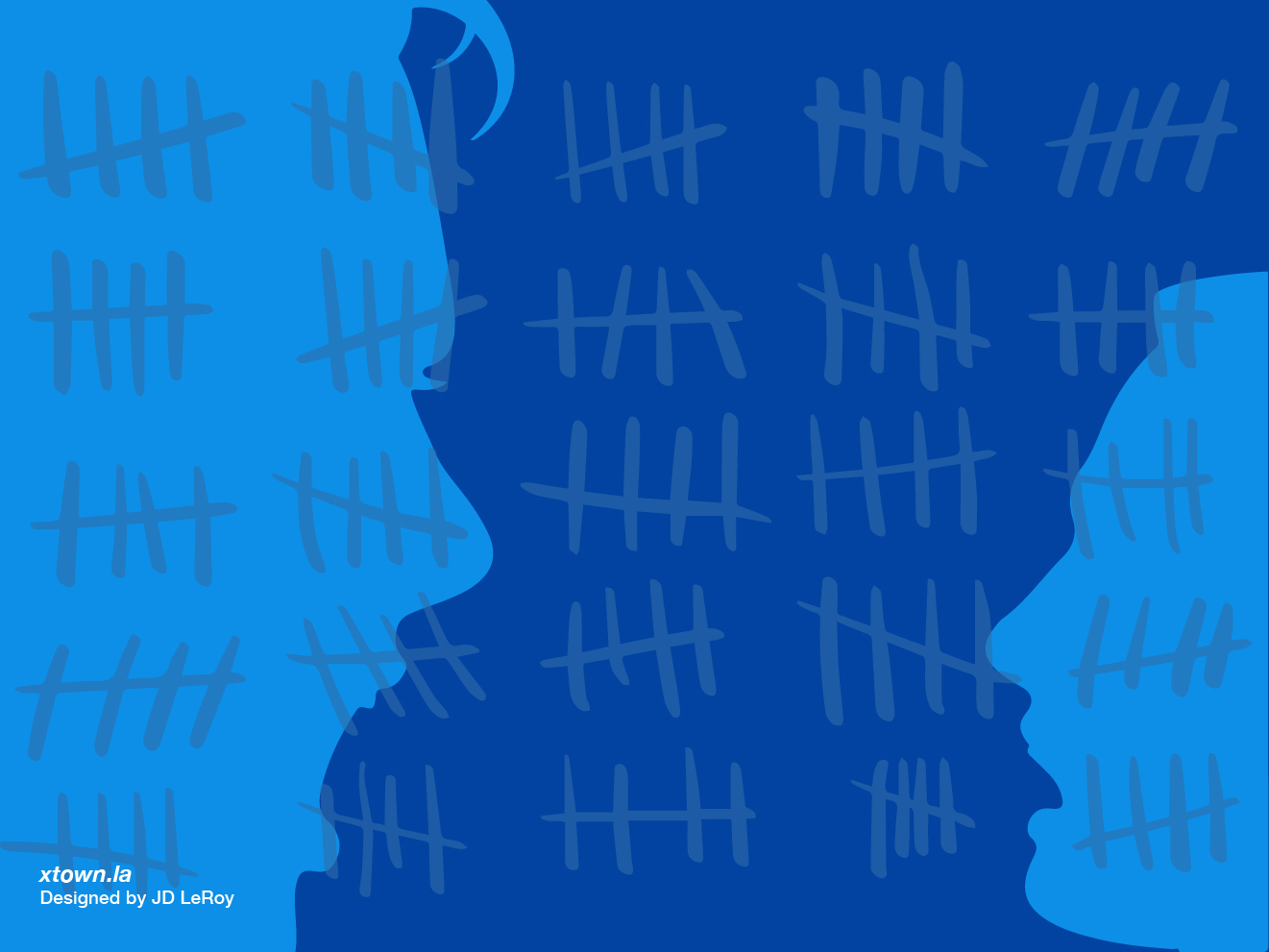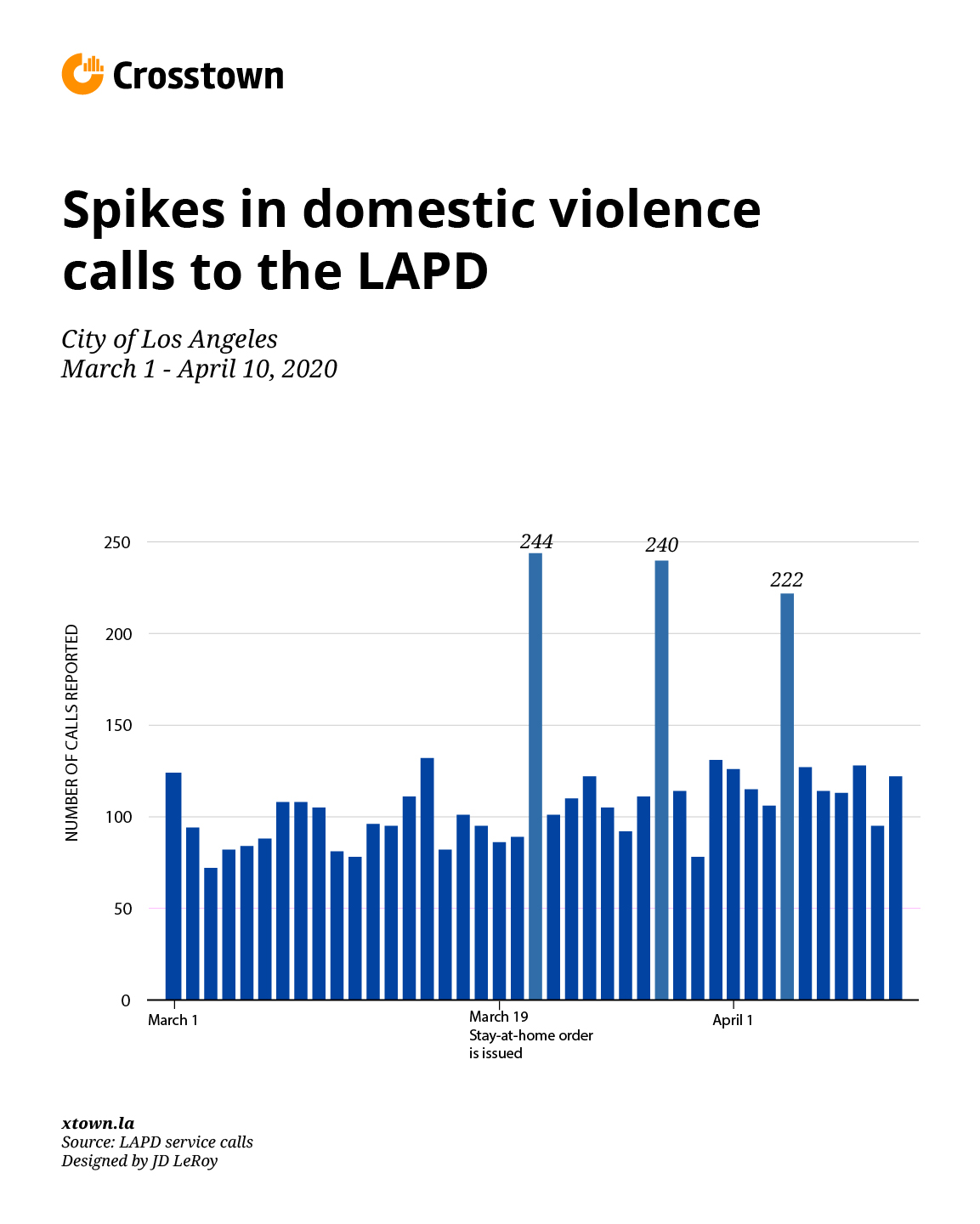Yes, domestic violence really is rising

Domestic violence calls to the Los Angeles Police Department are spiking, offering some of the clearest evidence yet that the mandated stay-at-home orders may be a catalyst for abuse.
Three times in the last three weeks the LAPD has responded to over 200 reports of domestic violence, more than double the daily average from February. During the first 10 days of April, the daily average of domestic violence service calls was 126.8, almost 20% above the same period a year ago.
“There have been more calls than ever,” said Det. Marie Sadanaga of the LAPD’s domestic violence unit.

Early signs of trouble
The first spike began early, on Saturday, March 21, two days after the shutdown orders to slow the spread of coronavirus went into effect. On that day, the LAPD responded to 244 calls, the most it has received so far this year. On March 28, the LAPD was hit with another spike of 240 calls. A week later, April 4, there were 222 calls.
Service calls are a record of all the instances that LAPD officers respond to. It includes calls that come in over 911, the department’s non-emergency number and events that officers respond to directly while in the field.
Experts had predicted that a protracted period of being stuck at home due to COVID-19 could lead to increases in violence. Now, nearly a month into the shutdown, those fears are starting to come true.
A ‘microcosm’ of what’s to come
“For this data to come back as it has, and with these numbers we are seeing, it may be a microcosm of what we’re going to see across the nation with COVID-19,” said Ruth Glenn, the chief executive of the National Coalition Against Domestic Violence. “It does not surprise me to some degree. On the other hand, these numbers do seem extremely high.”
Cases of domestic violence are often underreported. However, the LAPD’s Sadanaga said that the shutdown for coronavirus has made reporting even more difficult. Though calls have increased, in-person reporting of domestic violence has not, she said, which could be due in part to the fact that front desks at police stations have reduced service.
“Before, we had people come to the front desk of the station to report it, but now that’s closed,” Sadanaga said. “We’re confused how to go about it.”
Those who work with victims of domestic violence note that there can be a lag time — often lasting days — between when abuse happens and when it is reported. That is because victims often live with their abusers and must wait for an opportunity when they are safe enough to report.
However, some hotlines and service centers now report a rise in the number of calls they are receiving.
Need for outreach
The Jenesse Center, a South Los Angeles domestic violence organization, has been receiving calls at an unprecedented pace.
“We have a great increase of calls that are coming in throughout the week, especially on Fridays and Saturdays,” said Alice Brown, who oversees housing at the center. “I have never experienced it at this level. On an average day [now], we get anywhere from 20 to 30 calls. Before, we used to get only around five to ten calls a day. This all happened after the coronavirus spread, and now people are home more than ever before.”
The National Coalition Against Domestic Violence has also been stepping up its outreach in an attempt to connect with victims – especially people who are not able to report abuse. However, Glenn warns that the increase in calls to the LAPD may only be the tip of the iceberg.
“I think that the LAPD data might be a warning to the rest of us about what we might see coming,” said Glenn. “As we try to address the populations in need during COVID-19 – and there’s plenty of them – we need to keep in mind that there are victims at home with people who can really hurt them.”
How we did it: We used publicly available data from the City of Los Angeles’ Open Data Portal to identify instances of domestic violence reported on service calls.
The LAPD does periodically update past reports with new information, which sometimes leads them to recategorize past reports. Those revised reports do not always automatically become part of the public database. We try to update our reporting when new data becomes available.
Want to know more? Or simply just interested in our data? Email us at askus@xtown.la.






